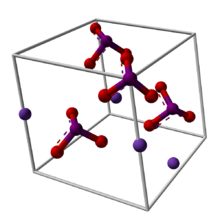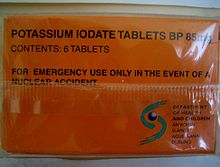Potassium iodate

| |

| |
| Names | |
|---|---|
| IUPAC name
Potassium iodate
| |
| Other names
Iodic acid, potassium salt
| |
| Identifiers | |
3D model (JSmol)
|
|
| ChemSpider | |
| DrugBank | |
| ECHA InfoCard | 100.028.938 |
| EC Number |
|
| E number | E917 (glazing agents, ...) |
PubChem CID
|
|
| RTECS number |
|
| UNII | |
CompTox Dashboard (EPA)
|
|
| |
| |
| Properties | |
| KIO3 | |
| Molar mass | 214.001 g/mol |
| Appearance | white crystalline powder |
| Odor | odorless |
| Density | 3.89 g/cm3 |
| Melting point | 560 °C (1,040 °F; 833 K) (decomposes) |
| 4.74 g/100 mL (0 °C) 9.16 g/100 mL (25 °C) 32.3 g/100 mL (100 °C) | |
| Solubility | soluble in KI solution insoluble in alcohol, liquid ammonia, nitric acid |
| −63.1·10−6 cm3/mol | |
| Hazards | |
| GHS labelling: | |
  
| |
| H272, H302, H318 | |
| P210, P280, P301+P312+P330, P305+P351+P338+P310 | |
| NFPA 704 (fire diamond) | |
| Flash point | Non-flammable |
| Related compounds | |
Other anions
|
Potassium chlorate Potassium bromate |
Other cations
|
Sodium iodate |
Related compounds
|
Potassium iodide Potassium periodate |
Except where otherwise noted, data are given for materials in their standard state (at 25 °C [77 °F], 100 kPa).
| |
Potassium iodate (KIO3) is an ionic inorganic compound with the formula KIO3. It is a white salt that is soluble in water.[1]
Preparation and properties
[edit]It can be prepared by reacting a potassium-containing base such as potassium hydroxide with iodic acid, for example:[1]
It can also be prepared by adding iodine to a hot, concentrated solution of potassium hydroxide:[1]
Or by fusing potassium iodide with potassium chlorate, bromate or perchlorate, the melt is extracted with water and potassium iodate is isolated from the solution by crystallization:[2]
- KI + KClO3 → KIO3 + KCl
The analogous reaction with potassium hypochlorite is also possible:[3]
KI + 3KOCl → 3KCl + KIO3
Conditions/substances to avoid include: heat, shock, friction,[4] combustible materials,[1] reducing materials, aluminium,[4] organic compounds,[1] carbon, hydrogen peroxide and sulfides.[4]
Applications
[edit]Potassium iodate is sometimes used for iodination of table salt to prevent iodine deficiency. In the US, iodized salt contains antioxidants, because atmospheric oxygen can oxidize wet iodide to iodine; other countries simply use potassium iodate instead.[5] Salt mixed with ferrous fumarate and potassium iodate, "double fortified salt", are used to address both iron and iodine deficiencies.[6] Potassium iodate is also used to provide iodine in some baby formula.[7]
Like potassium bromate, potassium iodate is occasionally used as a maturing agent in baking.[8]
Radiation protection
[edit]
Potassium iodate may be used to protect against accumulation of radioactive iodine in the thyroid by saturating the body with a stable source of iodine prior to exposure.[9] Approved by the World Health Organization for radiation protection, potassium iodate (KIO3) is an alternative to potassium iodide (KI), which has poor shelf life in hot and humid climates.[10] The UK, Singapore, United Arab Emirates, and the U.S. states Idaho and Utah all maintain potassium iodate tablets towards this end.[citation needed] Following the September 11 attacks, the government of Ireland issued potassium iodate tablets to all households for a similar purpose.[11]
| Age | KI in mg | KIO3 in mg |
|---|---|---|
| Over 12 years old | 130 | 170 |
| 3 – 12 years old | 65 | 85 |
| 1 – 36 months old | 32 | 42 |
| < 1 month old | 16 | 21 |
Potassium iodate is not approved by the U.S. Food and Drug Administration (FDA) for use as a thyroid blocker, and the FDA has taken action against US websites that promote this use.[13][14]
Safety
[edit]Potassium iodate is an oxidizing agent and as such it can form explosive mixtures when combined with organic compounds.[1]
References
[edit]- ^ a b c d e f Lyday, Phyllis A.; Kaiho Tatsuo (26 November 2015). "Iodine and Iodine Compounds". In Ley, Claudia (ed.). Ullmann's Encyclopedia of Industrial Chemistry (7th ed.). Weinheim: Wiley-VCH. p. 9. doi:10.1002/14356007.a14_381.pub2. ISBN 9783527306732.
- ^ Pradyot Patnaik. Handbook of Inorganic Chemicals. McGraw-Hill, 2002, ISBN 0-07-049439-8
- ^ Andrews, Launcelot W. (July 1903). "Titrations with potassium iodide". Journal of the American Chemical Society. 25 (7). Easton, Pennsylvania: US Postal Service: 756. doi:10.1021/ja02009a012 – via HathiTrust.
- ^ a b c Regulatory Affairs (23 March 2023). "Safety Data Sheet" (Potassium iodate MSDS) (5 ed.). Fair Lawn, NJ: Thermo Fisher Scientific. Archived from the original on 22 September 2023. Retrieved 22 September 2023.
- ^ Arroyave, Guillermo; Pineda, Oscar; Scrimshaw, Nevin S. (1956) [May 1955]. "The stability of potassium iodate in crude table salt". Bulletin of the World Health Organization. 14 (1): 183–185. PMC 2538103. PMID 13329845.
- ^ Diosady, Levente L.; Mannar, M.G. Venkatesh; Krishnaswamy, Kiruba (2019). "Improving the lives of millions through new double fortification of salt technology". Maternal & Child Nutrition. 15 (Suppl 3): e12773. doi:10.1111/mcn.12773. PMC 6594086. PMID 31148400.
- ^ James, Maia (2023-04-04). "Best Baby Formula Guide". Gimme the Good Stuff. Retrieved 2023-09-22.
- ^ Carson, Lin (ed.). "Potassium iodate". BAKERpedia. Portland, OR. Retrieved 22 September 2023.
- ^ Astbury, John; Horsley, Stephen; Gent, Nick (1999), "Evaluation of a scheme for the pre-distribution of stable iodine (potassium iodate) to the civilian population residing within the immediate countermeasures zone of a nuclear submarine construction facility", Journal of Public Health, 21 (4): 2008–10, doi:10.1093/pubmed/21.4.412, PMID 11469363, archived from the original on 2008-09-05
- ^ Pahuja, D.N.; Rajan, M.G.; Borkar, A.V.; Samuel, A.M. (Nov 2008), "Potassium iodate and its comparison to potassium iodide as a blocker of 131I uptake by the thyroid in rats", Health Physics, 65 (5): 545–9, doi:10.1097/00004032-199311000-00014, PMID 8225995
- ^ "Decision to Discontinue the Future Distribution of Iodine Tablets". Archived from the original on 2013-10-18. Retrieved 2013-05-22.
- ^ Guidelines for Iodine Prophylaxis following Nuclear Accidents (PDF), Geneva: World Health Organization, 1999
- ^ "Potassium iodide vs potassium iodate. Which one works?".
- ^ W. Charles Becoat (29 May 2003). "Potassium Iodate Warning Letter" (PDF). Food and Drug Administration.

